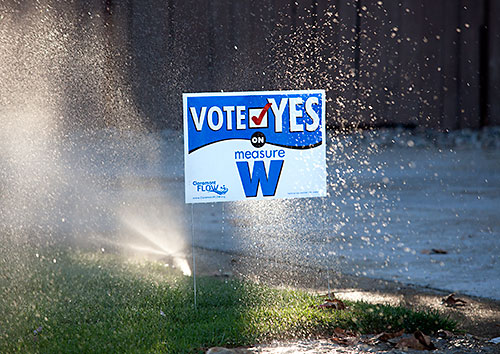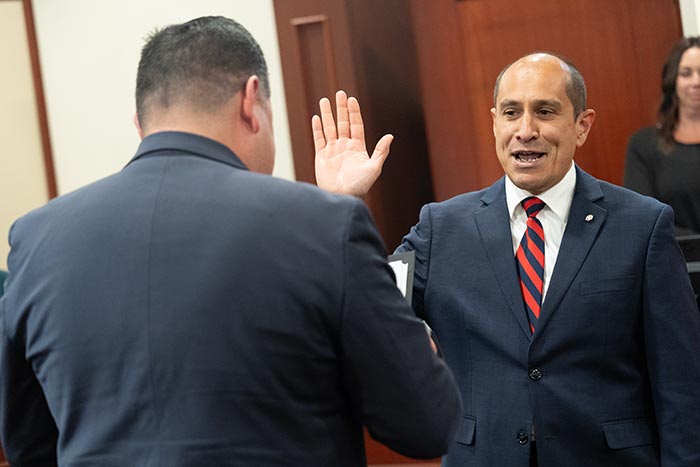Council votes to continue the water fight

Claremont isn’t going down without a fight, at least when it comes to taking over the water system.
The city council voted unanimously Tuesday night to appeal the decision against the city by an LA Superior Court judge. The city cited a mandate from the public, who overwhelmingly voted in favor of a measure to embark on the takeover.
Mayor Sam Pedroza noted that the city is “charting new ground” in the groundbreaking eminent domain claim and that time will be the judge on whether or not the takeover is successful.
“No one is making this decision lightly whatsoever,” he said while becoming emotional. “I’m very proud to be part of this council and I’m very proud to be part of Claremont.”
Judge Richard Fruin handed down the 41-page final decision on December 9, claiming Golden State Water Company (GSW) refuted every claim the city made in the 21-day right-to-take trial. Notably, the court did not accept the city’s administrative record—including years of testimony from Claremont officials and residents—which the city has highlighted as a major oversight.
The city has until February 7 to appeal the decision.
In a statement provided to the COURIER, GSW Senior Vice President of Regulated Utilities Denise Kruger lambasted the city’s decision to appeal.
“It is disappointing that the city of Claremont has chosen to appeal the decisive ruling made by a Superior Court judge in favor of Golden State Water Company. Claremont taxpayers will now be forced to pay millions more in additional legal fees and interest charges,” she said. “This will not distract Golden State Water from its commitment, and we remain focused on providing reliable, quality water service to all our Claremont customers.”
The city selected appellate firm Horvitz & Levy LLP, from which David Axelrad was present at the meeting. Mr. Axelrad stressed that the appeal process was not a re-hashing of the previous trial, but rather an attempt to look into any missteps made by the court.
Under the plan, the city is set to allocate $450,000 toward the possibility of the appeal, $400,000 of which would go to Horvitz & Levy to pore over the transcripts of the case to look for any errors. The remaining $50,000 will go to Best Best & Kreiger, the city’s counsel during the trial, to work with Horvitz & Levy in case they need assistance.
Mr. Axelrad, when pressed by Mr. Pedroza on a possible timeline, stated that process could take two to three months because of the complexities of the case.
Mr. Axelrad also noted that it was “very unusual” that the city only had a “rebuttable resumption” of a more public use of the system, which GSW successfully overcame during the trial.
“Ordinarily, the city’s adoption of the resolution of necessity would create almost a conclusive fact that there was a more appropriate public use of the utility,” he told the council. “In this particular case, the statute is specially worded to create this almost more difficult situation for a city to exercise the right to eminent domain over a public water utility.”
The city charted a couple of different scenarios for how a possible appeal would play out—a full retrial, which would cost the city $2 to 3 million over two years and would incur a cost of $8.75 to 18.04 million if the city loses; and a partial trial, which would cost up to $150,000 to $2 million over two years and would incur a cost of $5.05 to 15.04 million if the city loses.
So far, the takeover quest’s bill has tentatively reached the tens of millions. The city has already spent $6.14 million since 2012—$1.84 million prior to the trial for CEQA reviews, feasibility studies and prior GSW lawsuits; and $4.30 million for the trial. GSW has given the city a $7.69 million claim to cover their legal expenses, of which the city filed a motion January 26 to possibly lower the cost by 50 percent. A hearing on those claims is set for February 15 with Judge Fruin.
Since the city has chosen to appeal, GSW’s fees will be stayed, but will accrue an interest rate of 7 percent throughout the up to two-year appeal process, the city said. Those interest charges would range from $500,000 to $1 million.
The council heard from impassioned public speakers—39 in all—from both sides of the aisle.
Marilee Scaff, who has studied the issue for decades and co-wrote the directive that kicked the takeover quest into high gear, implored the city to continue with the appeal.
“We knew when we started that this was a complicated operation,” she said.
Sally Seven asserted that the judge erred when he treated Ms. Scaff dismissively during the trial, arguing with the city’s lawyers over whether or not she should testify before eventually relenting.
“But then he didn’t hear her,” she said. “He didn’t listen. He could have learned. He seemed to have no sympathy at all, even no understanding of public interest and public good. He had more than adequate understanding of what corporations were about.”
On the other side of the coin, Jim Belna—who has been against the takeover since the early days of Measure W in 2014—insisted the public has a right to know about the city’s chances of prevailing in an appeal, something the city’s lawyers reportedly would not comment on.
“Their very silence is perhaps the most honest opinion that we could ever hope to receive,” he said.
He also suggested on hanging back and watching the outcome of Ojai’s current bid for taking over their water system. “If they can make a takeover work, all the expensive legal issues will already be resolved for us, and Claremont can take a fresh look at this for ourselves,” he said.
Councilmember Opanyi Nasiali, in his remarks, called that idea a “cop out” and invoked a revolutionary analogy to support his claim.
“If the people who were fighting to get this country to become an independent nation said, ‘We’ll let some other colony in the world go fight King George and see how they proceed before we decide,’ chances may be King George would still be ruling this country,” he said.
Councilmember Corey Calaycay said he was initially opposed to the takeover when he first ran for city council, but GSW’s behavior during the economic downturn that changed his mind, in particular the way the water company billed their residents through the WRAM surcharge to cover their losses.
“That was particularly offensive to me, because we had a lot of folks who claim to be for free market systems,” he said. “This was not a free market system.”
Councilmember Larry Schroeder noted that the city should at least give the appellate firm a chance to look into the trial for errors, and noted that no future council would carry the torch if Claremont did not appeal.
“This is our time, this is our one opportunity,” he said. “So I say, let’s go ahead with the appeal.”
—Matthew Bramlett
news@claremont-courier.com











0 Comments